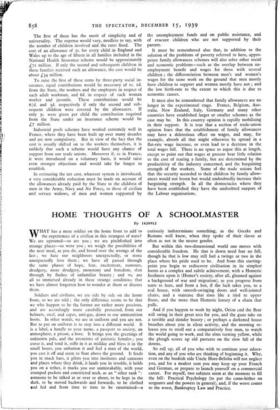HOME THOUGHTS OF A SCHOOLMASTER
By 1428912
WHAT has a mere soldier on the home front to add to the experiences of a civilian in this strangest of wars? We are uprooted—so are you ; we are pitchforked into strange places—so were you ; we weigh the possibilities of the next meal, as you do, and brood over the wrongs of the last ; we hate our neighbours unexpectedly, or more unexpectedly love them ; we have all passed through the same phases of hope, fear, excitement, rumours, drudgery, more drudgery, monotony and boredom, shot through by flashes of unfamiliar beauty ; and we are all so immersed already in these strange conditions that we have almost forgotten how to wonder at them or discuss them.
Soldiers and civilians, we are side by side on the home front, so we are told ; the only difference seems to be that we who happen to be the former are rather more precious, and are accordingly more carefully protected, from our helmets, steel, and capes, anti-gas, down to our ammunition boots. In other words, we are in uniform and you are not. But to put on uniform is to step into a different world. It is a label, a handle to your name, a passport to society, an atmosphere, a prison, a bore. It brings you the greetings of unknown pals, and the attentions of patriotic females ; you curse it, and tend it, stifle in it at midday and bless it in the small hours, you unbutton it and feel a man of the world, you cast it off and seem to float above the ground. It feeds you in snack bars, it pilots you into institutes and canteens and places where they drink, it lands you in trouble, it holds you on a tether, it marks you out unmistakably, with your cramped pockets and constricted neck, as an " other rank ": someone to be talked at or over or about, to be kept in the dark, to be moved backwards and forwards, to be clothed and fed and from time to time to be entertained—a curiously indeterminate something, as the Greeks and Romans well knew, when they spoke of their slaves as often as not in the neuter gender.
But within this two-dimensional world one moves with considerable freedom. He that is down need fear no fall, though he that is low may still feel a twinge or two in the place where his pride used to be. And from this starting- point you begin to rediscover civilisation in its simplest forms as a complex and subtle achievement, with a Homeric freshness upon it (Homer's society, after all, gleamed against a background of war and migration), as you progress from tents to huts, and from a hut, if the luck takes you, to a real house, with smooth-swinging doors and well-jointed chairs, and a staircase that rises like a bird to upper floors, and the more than Homeric luxury of a chain that pulls.
And if you happen to work by night, Orion Lnd the Bear will swing in their great arcs for you, and the guns take on a terrible and slender beauty ; or perhaps a darkened house breathes about you in silent activity, and the morning re- leases you to stroll out a comparatively free man, to watch the world going to work, and the elms turning yellow, while the plough scores up old pastures on the slow fall of the downs.
So roll up, all of you who wish to continue your educa- tion, and any of you who are thinking of beginning it. Why, even on the bookish side Uncle Hore-Belisha will not neglect you, and for a modest sum you may keep up your French and German, or prepare to launch yourself on a commercial career. For myself, two subjects seem at the moment to fill the bill: Practical Psychology (to put the come-hither on sergeants and the powers in general), and, if the worst comes to the worst, Bankruptcy Law and Practice.








































 Previous page
Previous page